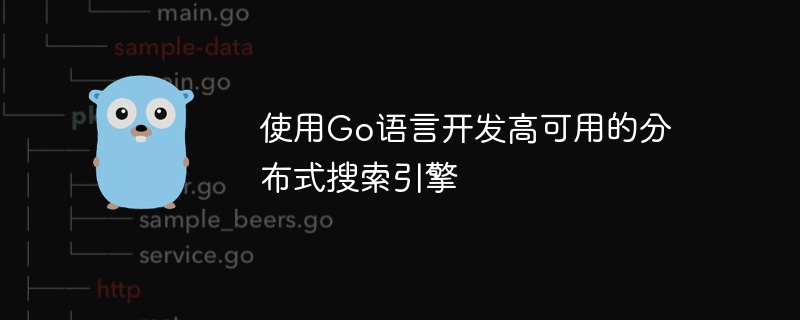Home >Backend Development >Golang >Develop a highly available distributed search engine using Go language
Develop a highly available distributed search engine using Go language
- PHPzOriginal
- 2023-11-20 16:18:31637browse

Using Go language to develop a highly available distributed search engine
Introduction:
With the rapid development of the Internet, the explosive growth of data and the increasing demand for data With the increasing demand for fast retrieval, search engines play a vital role in modern society. However, traditional stand-alone search engines face performance bottlenecks and poor reliability when processing large-scale data. To overcome these problems, distributed search engines emerged. This article will introduce how to use Go language to develop a highly available distributed search engine implementation method and related technical points.
Part One: How Distributed Search Engines Work
1.1 Index Construction: The core function of distributed search engines is to build large-scale data sets into indexes that can be used for fast retrieval. In a distributed environment, data is divided into multiple shards and stored on different nodes. Each node is responsible for processing its own stored data fragments and sending the constructed index information to the coordinating node.
1.2 Query processing: When the user initiates a query request, the query request will be sent to the coordination node. The coordination node forwards the query task to each storage node based on the index information, and summarizes and sorts the results. Finally Return to user.
Part 2: Application of Go language in distributed search engines
2.1 Concurrency processing: Go language inherently supports concurrent programming. By using goroutine and channel, we can easily implement tasks Parallel processing, and improve the processing power and performance of search engines.
2.2 Distributed communication: Go language has powerful network programming capabilities and supports common network communication protocols, such as HTTP, TCP, and UDP. We can use the standard library of Go language or third-party libraries to build the communication mechanism between nodes.
2.3 Distributed storage: Go language provides rich file operation and database access interfaces. We can use these interfaces to implement the storage and reading functions of distributed indexes.
Part 3: Implementation of high availability
3.1 Node fault tolerance: In a distributed system, the availability of nodes is crucial. In order to ensure the high availability of the search engine, we can use the error handling mechanism and circuit breaker mode of the Go language to handle node failures and exceptions.
3.2 Data backup: In order to prevent data loss or damage, we can ensure data reliability through data backup. In Go language, we can use distributed storage systems such as HDFS or GFS to achieve data backup and redundant storage.
3.3 Load balancing: In order to improve the concurrent processing capability and performance of the search engine, we can use the load balancing algorithm of the Go language to balance the load of each node, thereby reducing the pressure on a single node.
Conclusion:
This article introduces the implementation method and related technical points of how to use Go language to develop a highly available distributed search engine. By rationally using the concurrent programming, distributed communication, and distributed storage features of the Go language, we can implement a high-performance, highly available distributed search engine to meet the growing data retrieval needs of modern society.
The above is the detailed content of Develop a highly available distributed search engine using Go language. For more information, please follow other related articles on the PHP Chinese website!
Related articles
See more- High-concurrency website system construction: stand-alone to distributed cluster
- Can Baidu search engine recognize Android and IOS mobile terminals?
- What are distributed databases?
- What will happen if developer options are turned on for a long time?
- Experience Tip: Use Go language to build a highly available file server

